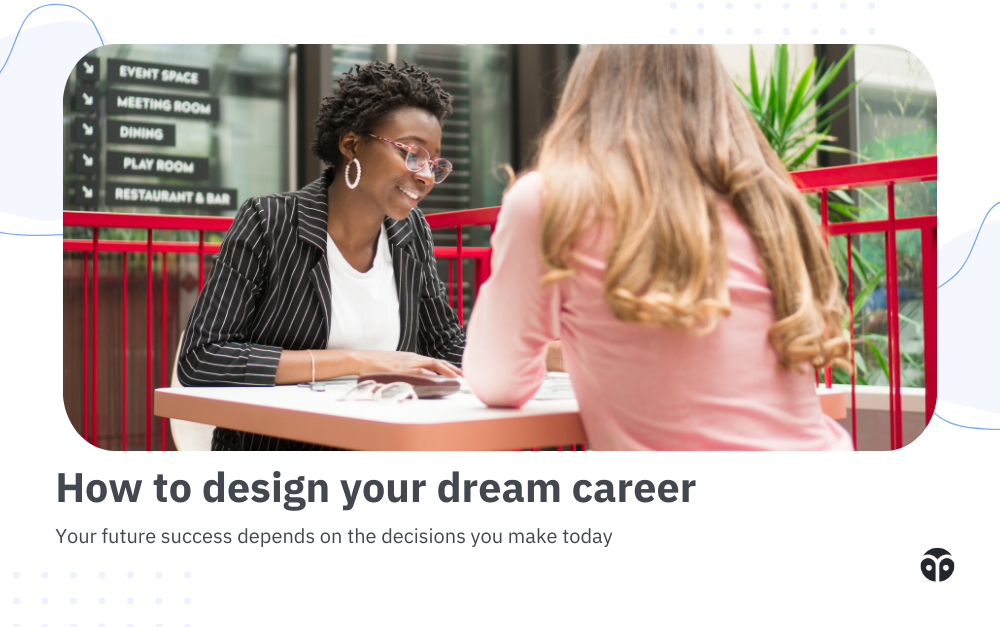Stop drifting and design your dream career
Learn how to align your work with what excites you, choose the right path, and make strategic decisions that shape your long-term success.

Many engineers think about career progression in terms of external factors — getting a promotion, landing a job at a top company, or acing an interview. But the biggest career makers don’t happen during a job switch. They happen long before that, in the decisions you make every day about your work.
What projects do you sign up for? What teams do you join? What technical challenges do you take on? These choices, made months or even years before a job search, determine where you end up.
If you want to do fulfilling work that aligns with your long-term goals, you need introspection — a clear, structured way to assess what you want out of your career.
Let’s walk through a framework for thinking about your career path with clarity.
Step 1: Identify what fulfilling work looks like for you
Most engineers don’t pause to consider what kind of work makes them feel excited, challenged, or engaged. Instead, they focus on what’s rewarded externally — titles, compensation, or prestige. But job satisfaction and long-term success come from aligning your day-to-day work with what truly excites you.
Think about the moments when you’ve felt the most energized in your career. What were you working on? What role did you play? Who were you collaborating with? Understanding your natural preferences will help you shape your career around work that keeps you motivated long-term.
The five core engineering focus areas
Different engineers find fulfillment in different aspects of their work. Consider where you naturally gravitate:
1. Decision-making & strategy
Some engineers love the big-picture thinking that goes into making technical and product decisions. At first glance, decision-making might seem like a straightforward and exciting role — you make choices, and the team executes them.
But in reality, it’s a highly complex process that requires:
- Deep user research and data analysis.
- Constant discussion and debate about trade-offs.
- The ability to build compelling arguments and persuade others.
For every engineering problem, there are hundreds of possible solutions. A good decision-maker is someone who can filter through those options, balancing technical feasibility, user needs, and business impact to choose the best approach. If you thrive on big-picture thinking, influencing strategy, and weighing trade-offs, this may be where you find the most fulfillment.
2. Architecting solutions
Many engineers are drawn to the challenge of designing scalable, efficient systems. However, architecture is often misunderstood. Some see it as an opportunity to invent elegant solutions from scratch, but in reality, architecture is about trade-offs.
Consider the design of a car. A company might advertise a car as “built with zero compromises,” but every car design requires compromises—between speed, fuel efficiency, cost, and aesthetics. Engineering is the same way. Every decision has constraints.
Good architects:
- Identify the key trade-offs involved in different solutions.
- Consider long-term maintainability and scalability.
- Weigh cost, team expertise, and future needs against technical elegance.
Architecture could be a deeply fulfilling career focus if you love solving complex technical problems, making system-wide decisions, and thinking through long-term implications.
3. Hiring & team growth
Some engineers thrive in hiring and team-building, where the challenge isn’t writing code but finding the right people to write the code.
This means:
- Structuring teams effectively by defining clear roles.
- Understanding what skills and backgrounds are needed for success.
- Designing interview processes that assess candidates effectively.
Beyond hiring, developing internal talent is just as important. Helping engineers grow, get promoted, and reach their potential is a core leadership responsibility. If you enjoy shaping teams, helping others succeed, and making high-stakes hiring decisions, this could be a rewarding area to focus on.
4. Mentorship & career development
Some engineers prefer mentorship, working one-on-one to help others grow in their careers, navigate challenges, and find meaningful opportunities. While hiring focuses on bringing people in, mentorship focuses on developing the talent that’s already there.
Strong mentors:
- Understand what their mentees want long-term and map those goals to real opportunities.
- Help engineers find the right projects to build their skills.
- Teach mentees how to articulate their impact to get recognized and promoted.
If you love guiding others, coaching engineers one-on-one, and making an impact through people, mentorship might be one of the most fulfilling ways to shape your career.
5. Hands-on technical work
Some engineers simply love being hands-on with technical work—writing code, solving hard problems, debugging tricky issues, and optimizing performance. These engineers don’t necessarily want to move into management or strategy; they find deep satisfaction in technical problem-solving.
Engineers who reach the highest levels of IC progression (L8, L9):
- Build frameworks or tools that impact entire teams or industries.
- Push technical boundaries by developing new standards.
- Become recognized experts in their domain, sometimes even leading open-source contributions.
If you love solving complex problems, staying hands-on with technology, and pushing the boundaries of what’s possible, staying on the IC track might be the best path for you.
Step 2: Choose your career path based on your strengths
Once you have a sense of what kind of work excites you, the next step is figuring out how to apply that to your career path. Not all engineers are on the same trajectory, and there are multiple paths to success.
Some engineers thrive as Individual Contributors (ICs), focusing on deep technical work and solving complex engineering challenges. Others prefer to take on Tech Lead roles, where they still contribute technically but also mentor others and guide the direction of a project. And then there are those who move into Engineering Management, where the focus shifts to hiring, career development, and ensuring teams are set up for success.
Each of these paths requires different skills, so choosing the right one ensures long-term job satisfaction.
Beyond career tracks, there’s also the question of specialization versus generalization. Some engineers love becoming experts in one area, whether that’s frontend, backend, infrastructure, or security. They enjoy going deep, mastering frameworks, and becoming the go-to person for a specific technical challenge. Others prefer a generalist approach, where they can move fluidly between different technologies and take on a wide range of challenges. Generalists often thrive in fast-moving environments like startups, where adaptability is key.
There’s no single right answer. The best path is the one that aligns with your skills, interests, and long-term goals.
Step 3: Consider what motivates you
After identifying what fulfills you and choosing a career path, the next step is to consider what truly motivates you to help guide your career decisions.
Some engineers are mission-driven, meaning they are passionate about solving real-world problems like climate change, healthcare, or education. They choose roles based on impact rather than just technical challenges.
Others are technically driven and care most about solving hard engineering problems. They might not be as concerned with which industry they work in, as long as they get to push the boundaries of what’s technically possible.
Then there are engineers who are team-driven — they find fulfillment in working with great people, fostering strong engineering cultures, and mentoring others. For them, the who matters just as much as the what.
It’s easy to say that all of these things are important, but in reality, prioritization is key.
If everything is a priority, then nothing is. Knowing what drives you will help you make better career choices — whether that’s choosing the right company, deciding between two job offers, or figuring out where to invest your time.
Take control of your career journey
Your career isn’t something that just happens to you — it’s something you shape.
By making intentional decisions about what work excites you, what career path aligns with your strengths, and what long-term goals matter most, you can build a career that’s both successful and personally fulfilling.
Be deliberate. Your future success depends on the choices you make today.
Get holistic interview prep with Formation
The Formation Fellowship gives mid-level and senior engineering job seekers everything they need to land their dream roles—including personalized skill brush-ups, resume help, unlimited mock interviews with experienced software engineers and hiring managers from top-tier tech companies, career and negotiation support, and more.
If you’re having trouble navigating your job search on your own, apply here and get unconditional support from a team of engineering mentors, technical recruiters, career coaches, and more.



